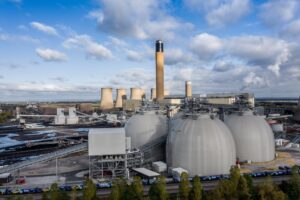
The government will commit billions of pounds to new energy projects at next week’s budget, in a bid to compete with rival markets such as the EU and US and shore up the country’s energy security in the aftermath of Russia’s invasion of Ukraine and squeeze on gas suppliers.
Chancellor Jeremy Hunt is expected to pledge £20bn to ramp up carbon capture and low carbon energy at next week’s budget, alongside unveiling a competition to pitch small, modular reactors in a boost to the UK’s nuclear industry.
He will commit to spades in the ground on these projects from next year.
Carbon capture and storage is the process in which industrial sources of CO2 are separated, treated and transported to a long-term storage location – such as within the seabed of the North Sea.
The UK is home to enough carbon capture capacity to store over a century and half of national annual CO2 emissions, which could help boost the country’s energy strategy.
Downing Street hopes carbon capture will support the UK’s industrial transition to net zero and cleaner technology – while giving the country the chance to be a world leader in an early-stage concept.
Hunt will announce plans to invest £20bn in investment over the next 20 years to push projects which will aim to store 20-30m tonnes of CO2 per year by 2030.
This is equal to the emissions from 10-15m cars on an annual basis.
So far, the UK has committed £1bn to develop four CCUS hubs in the UK by the end of the decade.
This follows increased international competition for energy investment, with the US looking to attract companies through vast subsidies and tax cuts passed in the Inflation Reduction Act.
The EU is looking to rival the act with its own investment agenda and loosening of state subsidies for energy projects.
Meanwhile, Great British Nuclear will now launch a competition for this country’s first SMRs – as the new industry body aims to hit the UK’s energy security target, raising nuclear generation from 7GW to 24GW over the next three decades.
The SMR competition will try to lure domestic and international manufacturers with the government prepared to match a proportion of private investment, to ensure designs are ready to be deployed as soon as possible in the UK to meet the country’s energy goals.
GBN has been set up to select sites for potential nuclear projects, removing costs, uncertainty, and bureaucratic barriers for manufacturers developing proposals.
Plans to further fund Rolls-Royce’s SMRs have faced delays in Whitehall, although the government has committed already to investing £210m into the SMR project – matched by private sector funding.
Rolls’ Royce reactor design is currently being assessed by safety regulator, the Office for Nuclear Regulation.
To this end, the Chancellor will confirm that nuclear power generation is classed as “environmentally sustainable” under the green taxonomy regime – subject to consultation – to encourage significant private investment.
Energy security secretary, Grant Shapps said: “Already a global leader in offshore wind power, we now want to do the same for the UK’s nuclear and carbon capture industries, which in turn will help cut the wholesale electricity prices to amongst the lowest in Europe.
“Today’s funding will play an integral role in delivering that, helping us further towards our net zero targets and creating green jobs across the country.”
Hunt added: “This plan will help drive energy bills down for households across the country and improve our energy security whilst delivering on one of our five promises to grow the economy.”
Read more:
Government pledges £20bn for carbon capture and nuclear ramp-up in clean energy push





